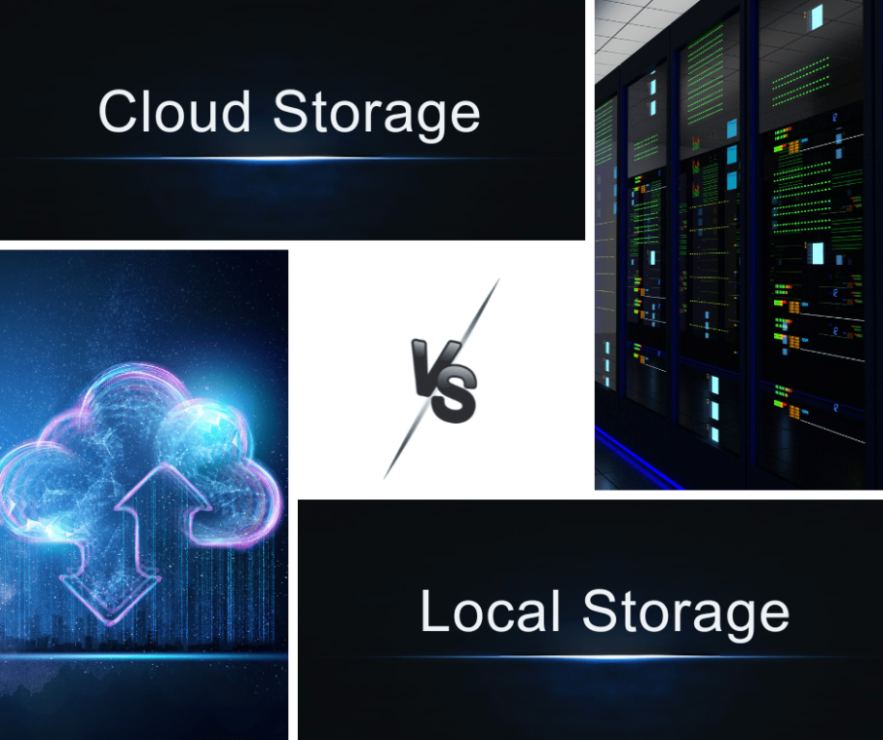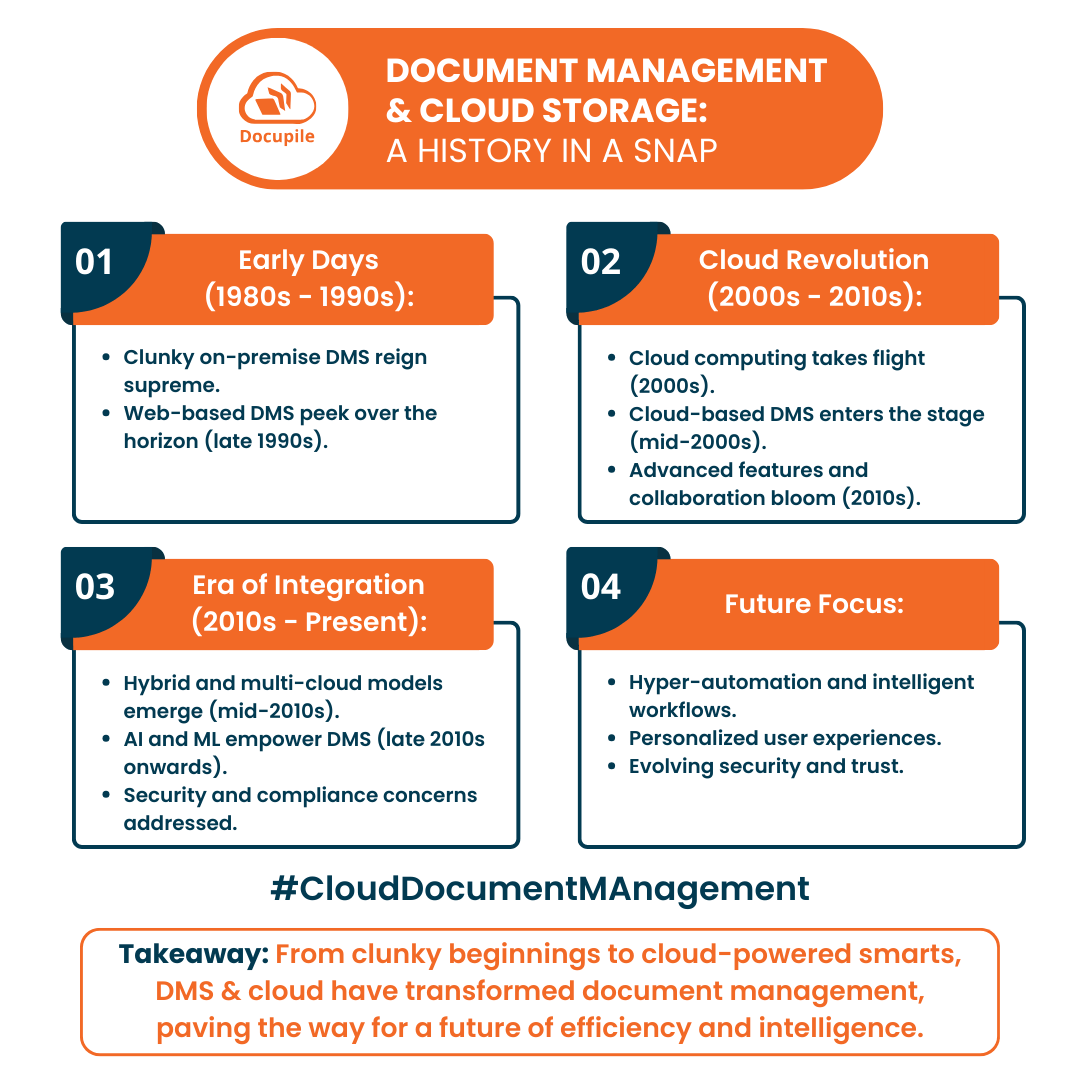Introduction
The advent of the digital age has reshaped the landscape of data management, with cloud storage emerging as a dominant force. This blog post aims to dissect the driving factors behind the popularity of cloud storage, shed light on vital information for decision makers, and conduct a comparative analysis vs on-premise storage. Additionally, we will navigate through the diverse types of cloud storage, decipher the maintenance obligations for businesses embracing cloud storage vs the local storage, and unravel the key considerations IT managers should weigh when contemplating its adoption.
Want to Learn More?
Check Out: Why HR Document Management System (DMS) Beats All DMS?
At a Glance
DMS & Cloud Storage – Infographic!
What Contributes to the Popularity of Cloud Storage?

Cloud storage’s widespread adoption can be attributed to its inherent benefits: flexibility, scalability, and cost-effectiveness. Its accessibility from anywhere, coupled with the ability to streamline collaborative efforts, has transformed the data management landscape, making it an indispensable tool for businesses of all sizes.
What Information Should Decision-Makers Be Aware of Regarding Cloud Storage?
Decision-makers need a comprehensive understanding of cloud storage to make informed choices for their organizations. They should be aware of the scalability benefits, allowing for flexible storage expansion based on business needs. Security measures, compliance requirements, and data accessibility are crucial aspects. Decision makers must assess service level agreements (SLAs), ensuring the cloud provider aligns with their business goals. Cost considerations, including potential hidden fees and subscription models, should be transparently communicated.
Which Option is Superior?

The perennial debate between cloud vs local storage involves a comprehensive comparison. While local storage may offer certain advantages, cloud storage shines in terms of accessibility, scalability, and collaborative functionalities. The choice ultimately depends on the unique needs of each business.
What Types of Cloud Storage Are Currently Accessible?
Various types of cloud storage cater to diverse needs. Object storage, ideal for unstructured data like images and videos, is scalable and cost effective. Decision makers should select the type aligning with their data characteristics and business requirements.
- 1
Block storage, offering high-performance data access, suits applications requiring quick data retrieval.
- 2
File storage mimics traditional file systems, facilitating easy collaboration.
- 3
Hybrid cloud storage combines on-premises and cloud solutions for flexibility.
- 4
Archival storage, designed for infrequently accessed data, provides cost-effective long-term retention.
Business’s Maintenance Obligations When Utilizing a Cloud Storage Solution
Businesses leveraging cloud storage must navigate through specific maintenance tasks. These include regular data backups, security updates, and ensuring the seamless integration of cloud solutions with existing workflows. These actions are pivotal for guaranteeing smooth operations and safeguarding data integrity.
In What Ways Does Cloud Storage Outperform Other Storage Solutions?

Cloud storage surpasses traditional solutions in several aspects. Accessibility is enhanced, enabling remote data retrieval from anywhere with an internet connection. Scalability ensures organizations can seamlessly expand storage based on evolving needs. Automated backups and versioning streamline data management. Collaboration is fostered through real time file sharing and editing. Cloud storage’s agility and adaptability outperform vs the rigid, on-premise storage alternatives. Additionally, cost-efficiency is achieved by eliminating the need for extensive physical infrastructure.
What Are the Drawbacks Associated with Cloud Storage?
Despite its advantages, cloud storage comes with certain drawbacks. Dependence on internet connectivity means potential access disruptions. Data security concerns arise due to reliance on external servers, necessitating robust encryption measures. Ongoing subscription costs might accumulate over time, impacting long term budgets. Limited customization options compared to on-premises solutions may be a drawback for some organizations. Privacy concerns and the potential for vendor lock-in require careful consideration.
How Are Vulnerabilities in Cloud Storage Addressed and Mitigated?

Effective mitigation of cloud storage vulnerabilities involves a multi layered approach. Robust encryption protocols, both in transit and at rest, enhance data security. Access controls and identity management systems restrict unauthorized entry. Regular security audits and updates ensure systems are fortified against emerging threats. Continuous monitoring, incident response plans, and employee training bolster the overall security posture. Collaborative efforts between cloud providers and users are essential for staying ahead of evolving security challenges.
How Do Cloud Vulnerabilities Fare vs Those Found in On-premise Storage?
While there are similarities, cloud and local storage vulnerabilities exhibit distinct characteristics. Both face risks related to data breaches and unauthorized access. However, cloud storage introduces additional concerns due to its shared infrastructure, potential exposure to third party vulnerabilities, and reliance on internet connectivity. Local storage vulnerabilities often involve physical breaches or localized security lapses. Mitigation strategies may overlap, but tailored approaches are necessary to address the unique challenges each storage type presents.
Cloud vs. Local Storage: Benefits & Challenges

In the ever evolving landscape of data management, the choice between on premise vs cloud storage is a pivotal decision for individuals and businesses alike. Each option comes with its own set of benefits and challenges, influencing how data is stored, accessed, and secured. Let’s delve into the comparison of cloud storage vs local storage to understand their respective advantages and considerations.
Benefits of Cloud Storage:
Benefits of Local Storage:
Challenges of Cloud Storage:
Challenges of Local Storage:
Frequently Asked Questions
More Questions
On-Premise vs Cloud Storage – Final Thoughts
The choice between cloud storage and local storage boils down to individual preferences, specific use cases, and company requirements. Cloud storage excels in accessibility, scalability, and collaborative features but comes with security considerations and ongoing costs. On the other hand, local storage provides control, offline access, and upfront cost advantages but may face challenges in scalability and remote accessibility. Ultimately, users must weigh the benefits against the challenges to make an informed decision that aligns with their unique needs and priorities.
Learn More – About the Features of a Cloud Document Management Software





